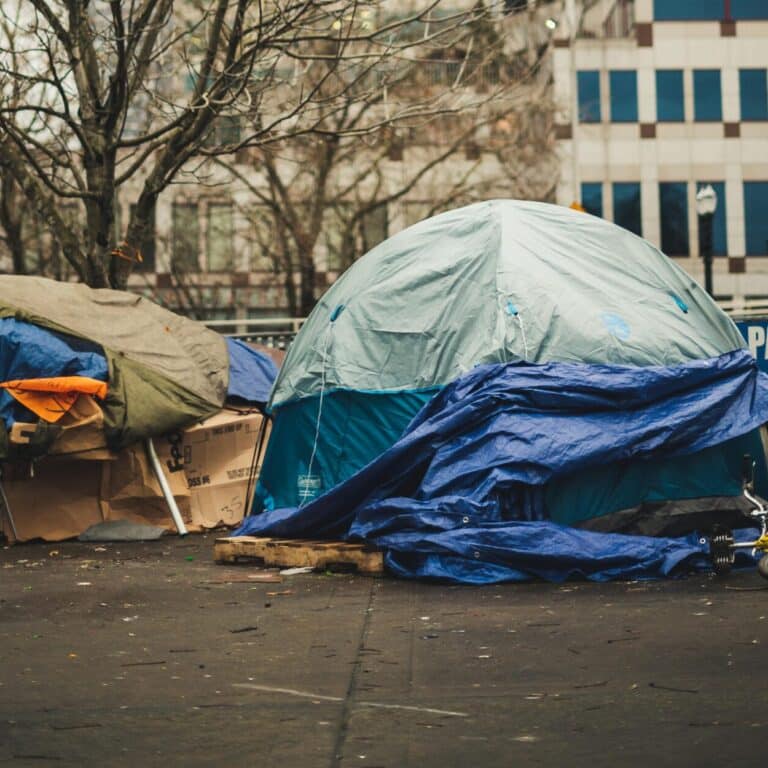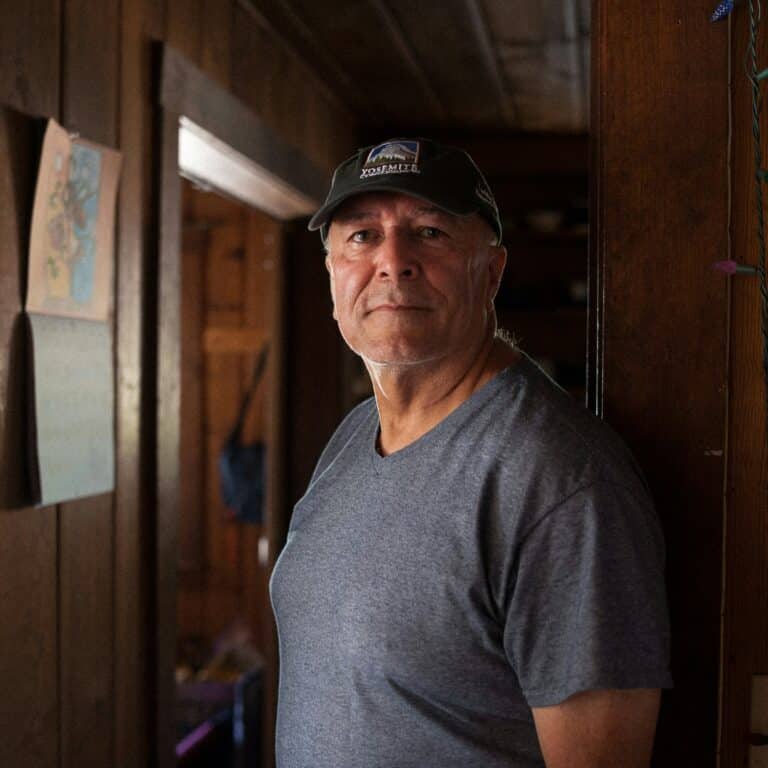What an adequate standard of living is
The right to an adequate standard of living entitles everyone to the progressive realization of a life without poverty. This right is enshrined in international law.
Domestic protections for an adequate standard of living are lacking. Economic, social and cultural rights—such as access to fundamental necessities like food, water and housing—continue to be routinely violated in Canada, despite our international commitments to ensure an adequate standard of living.
An inadequate standard of living is both a cause and an effect of inequality and injustice. Poverty has many causes, including racism, misogyny, xenophobia, ableism and other discriminatory systems. Inadequate income, social support systems, housing and taxation policies also continue to push families far below the poverty line. Meanwhile, many people living in poverty report experiencing discrimination and unequal treatment because they are poor.
What we’re doing
BC’s Office of the Human Rights Commissioner is committed to working toward effective and meaningful domestic protections for economic rights by engaging with poverty as a human rights issue and working to dismantle discrimination against people living in poverty.
In the current climate of economic uncertainty, a human rights-based approach necessitates that we stand firm against placing the brunt of economic downturn on the shoulders of those most marginalized and impoverished.
Learn more about our goals, desired outcomes and example focus areas relating to poverty in our strategic plan, Rising to the challenge: Path to 2030.



Working to protect the human rights of encampment residents
Homeless encampments are some of the most visible evidence of the failure by all levels of government to protect the human right to adequate housing. Here in B.C., recent years have seen encampments from Surrey to Smithers and Vernon to Victoria. Often, we respond not by addressing what causes encampments, but by scattering the people living there—frequently through police use of force. BCOHRC continues to work to respond to the rise of encampments as a failure to uphold the human right to adequate housing.
The Commissioner’s guidance addresses the issue as a right to adequate housing that all levels of government are responsible to uphold. The response outlines three main areas of importance: the right to adequate housing, the rights of encampment residents and the violation of human rights caused by forced evictions.
As discussed in her September 2023 op-ed on the subject as well as in her May 2025 joint letter with the Federal Housing Advocate, it is up to local authorities, in partnership with other levels of government, to fulfill their obligations to encampment residents and stop forcibly evicting them without regard to their legally protected human rights.

Other highlights
The following is a sample of our work relating to poverty. We encourage you to read our annual reports (accessible via our Publications page) to learn more about the work we have been doing on this priority.
Advocating for rights in the courts
B.C.’s Human Rights Commissioner is intervening in Fox, Scheu and Smith v. City of Victoria and Attorney General of British Columbia to clarify that cities have legal obligations to consider equality and non-discrimination when making decisions that affect unhoused people.
This case centres on two decisions made by the City of Victoria that limit unhoused people’s ability to shelter in City parks. The first decision, made in July 2024, closed Victoria West Park and Irving Park to overnight sheltering. The second, made in April 2025, restricted sheltering to 34 designated City Parks, many of which do not have basic facilities.
The B.C. Supreme Court granted the Commissioner leave to intervene in this case. The Commissioner intends to make submissions about the City’s legal obligation to non-discrimination against unhoused people when making decisions that affect them, including under international and domestic human rights laws. The Commissioner will also argue that City decisions must give appropriate weight to human rights obligations.
Supporting “social condition” as a protected ground in B.C.’s Human Rights Code
Because social condition is not on the list of protected grounds within the B.C. Human Rights Code, low-income people who face discrimination on the basis of poverty, education levels, stigma related to drug use or other aspects of social condition do not have access to justice when they face this kind of discrimination. Discrimination on the basis of social condition is a serious and long-standing issue in B.C. that has been raised by people and organizations across the province for many years. During COVID-19, we saw an escalation in the discrimination and violence facing people living in poverty.
Since 2020, BCOHRC has been calling for the addition of social condition to the Code. To learn more about this issue and to hear from low-income people who participated in the generation of this work, read our report on social condition.
To learn more about hate based on social condition during the COVID-19 pandemic, read this section of the final report of the Inquiry into hate in the pandemic.
Bringing international protections for economic rights home
In support of BCOHRC’s mandate to promote compliance with international human rights obligations, our first report to the United Nations periodic review process occurred in February of 2020 on the International Covenant on Economic, Social and Cultural Rights (ICESCR).
Under international law, economic rights—like the right to an adequate standard of living through necessities like food, water and housing—are protected. These basic rights, as well as rights to education, health care, work and more, are contained within the ICESCR, which Canada ratified in 1976.
However, these rights are not currently protected under Canadian domestic law, which makes them difficult to enforce. B.C.’s Human Rights Commissioner is committed to ensuring that there are domestic protections for economic rights. One way we work toward this is by engaging with the United Nation’s periodic review process, which looks at how countries are doing in relation to the rights outlined in the ICESCR.
The Commissioner is concerned that economic, social and cultural rights, such as access to basic needs like food, water and housing, continue to be routinely violated in Canada. Poverty in British Columbia is high: about one in nine residents—nearly 600,000 people—lives in poverty, and those receiving basic assistance are still left with an annualized income less than 50 per cent of the poverty line threshold.
What we know
After two years of sharp increases, an unacceptable one in six children in B.C. lived in poverty as of 2022—and rates are far higher among Indigenous and racialized children, reaching 42% in rural reserves.1
21.8 per cent of people lived in food-insecure households in 2023.2 This rises to 57.9 per cent among people whose main source of household income is from social assistance.3
In 2022, 16.8% of people in Canada with disabilities aged 15 years and older lived in poverty, representing 1.5 million people.4
Indigenous people are about 50% more likely to live in poverty than non-Indigenous people.5
- First Call Child and Youth Advocacy Society, 2024 BC Child Poverty Report Card (First Call Child and Youth Advocacy Society, 2024), https://firstcallbc.org/wp-content/uploads/2024/12/First_Call_Report_Card_2024_Final-Dec9.pdf.
- BC Centre for Disease Control, Household Food Insecurity in British Columbia (BC Centre for Disease Control, 2025), https://www.bccdc.ca/pop-public-health/Documents/HFI%20Knowledge%20Translation%20Tool%20April%202025%204.pdf.
- BC Centre for Disease Control, Priority Health Equity Indicators for British Columbia: Household Food Insecurity Update Report (BC Centre for Disease Control, Population Public Health, 2025), https://www.bccdc.ca/Documents/2023-10-18_HouseholdFoodInsecurityReport.pdf.
- Campaign 2000 and Disability Without Poverty, Disability Without Poverty: 2024 Disability Poverty Report Card, (Campaign 2000, 2024), https://www.disabilitywithoutpoverty.ca/sites/default/files/2024-12/FINAL-Disability-Poverty-Report-Card-English_compressed.pdf.
- Government of British Columbia. 2024 Poverty Reduction Strategy. (Government of British Columbia, 2024), https://www2.gov.bc.ca/assets/gov/british-columbians-our-governments/initiatives-plans-strategies/poverty-reduction-strategy/2024-bc-poverty-reduction-strategy.pdf.
